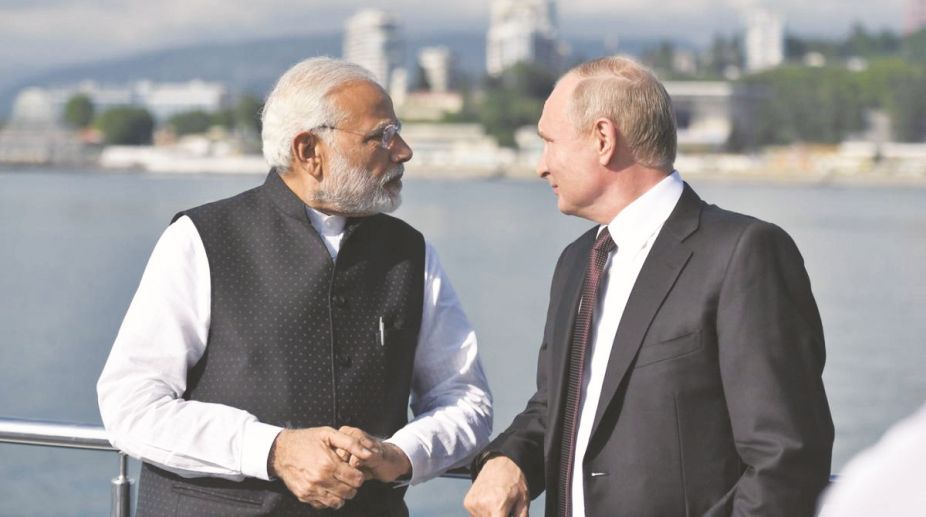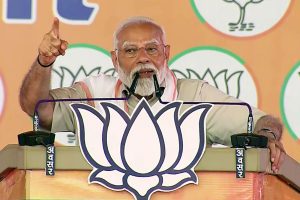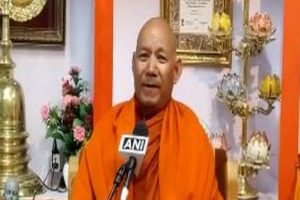According to Derek Grossman, senior defence analyst at the non-profit, non-partisan RAND Corporation of USA, Beijing may not have even wanted India to join the SCO.
Russia first proposed India as a member to strengthen bilateral economic and security engagement, but mainly to contain China’s growing influence in the organization. Russia is increasingly concerned that post-Soviet SCO members ~ Kazakhstan, Kyrgyzstan, Tajikistan, and Uzbekistan ~ are drifting towards China’s geostrategic orbit.
For example, it is well known that Moscow has long delayed implementing Chinese initiatives that would enable Beijing to reap greater benefits from regional trade, including establishing SCO’s regional trade agreement and bank.
As China gains more clout in Central Asia, Moscow welcomed New Delhi by its side to occasionally strengthen Russia’s hand at slowing or opposing Chinese initiatives. Indeed, during a recent visit to Moscow, Prime Minister Narendra Modi said, “India and Russia have always been together on international issues.”
Mr Modi’s informal summit with the Russian President, Vladimir Putin in Sochi on May 21 is part of the regular consultation between the leaderships of two countries.
This has been an important occasion for the two leaders to exchange views on international matters in a broad and long-term perspective with the objective of further strengthening Special and Privileged Strategic Partnership.
Going forward, this strategy is likely to pay rich dividends. New Delhi has a major hang-up related to the activities of its arch rival Pakistan ~ sponsored by Beijing at the 2015 SCO summit to balance Moscow’s support to India ~ and continues to be highly critical of China’s so-called “all-weather friendship” with Islamabad.
In May, New Delhi refused to send a delegation to Beijing’s widely publicised Belt and Road Initiative summit, which was aimed at increasing trade and infrastructure connectivity between China and Eurasian countries.
According to the Indian government, the flagship project of the Belt and Road Initiative ~ the China-Pakistan Economic Corridor ~ was not “pursued in a manner that respects sovereignty and territorial integrity.”
Indian opposition stems from the plan to build the corridor through the disputed Pakistan Occupied Kashmir (POK) region and to link it to the strategically positioned Pakistani port of Gwadar, prompting Mr Modi to raise the issue again during his acceptance speech at the SCO summit last month.
New Delhi is likely to continue criticising the corridor in the context of the SCO because, as a full member, India has the right to protest against developments that do not serve the interests of SCO members.
The SCO also offers another public stage for India to constantly question the intent behind China’s exceptionally close ties with Pakistan.
However, Beijing can play a balancing act to impart a measure of sobriety between the two warring countries by supporting the genuine demands of India on terrorism and counseling India on J&K for peaceful negotiations.
India-Pakistan tensions also occasionally flare up, and Beijing may have to brace for either side to use the SCO as a platform to mediate for an amicable solution. In the absence of a major incident, Beijing has admirably handled the delicate nature of this situation.
When asked in early June whether SCO membership would positively impact India-Pakistan relations, China’s spokesperson Hua Chunying said: “I see the journalist from Pakistan sit[s] right here, while journalists from India sit over there. Maybe someday you can sit closer to each other.”
Additionally, the Chinese military’s unofficial mouthpiece, Global Times, published an article suggesting that SCO membership for India and Pakistan would lead to positive bilateral developments. Even if that were overly optimistic, it would send the right tone as the organisation forges ahead.
Beijing needs to look no farther than South Asia for a cautionary tale. In this region, both India and Pakistan are members of SAARC. New Delhi, along with Afghanistan, Bangladesh and Bhutan, boycotted last year’s summit in Islamabad because it believed Pakistan was behind a terrorist attack on an Indian army base in J&K.
Even with an official ban on discussing bilateral issues in its proceedings, SAARC has been perennially hobbled by the intrusion of India-Pakistan disputes. Beijing can probably keep its close friend Islamabad in line at the SCO.
However, New Delhi would also have to fall in line. Another major issue for the SCO to contend with is the security of Afghanistan. An integral component of the organisation is the Regional Anti-Terrorist Structure, aimed at combating China’s “three evils” – terrorism, extremism, and separatism.
India, however, is likely to highlight the contradiction between China’s stated anti-terrorism goals and the reality of its policy. Most notably, Beijing has consistently looked the other way as Pakistani intelligence services continue to support terrorist groups in Afghanistan, including the Afghan Taliban and Haqqani network.
Moreover, India being particularly close to Afghanistan, could seek to sponsor Afghanistan to move from observer status towards full SCO membership. This would give India even greater strength in the group and could bolster Russia’s position as well.
Persistent border disputes and fierce geostrategic competition in South Asia between China and India are likely to temper any cooperation Beijing might hope to achieve with New Delhi in the SCO.
On the one hand, mutual suspicions in the maritime domain persist with the Indian government recently shoring up its position in the strategically important Andaman and Nicobar island chain to counter the perceived Chinese “string of pearls” strategy.
It is aimed at establishing access to naval ports throughout the Indian Ocean that could be militarily advantageous in a conflict. Such mutual suspicions are likely to impact SCO discussions on military matters.
China has naval bases in the making ~ Gwadar/Pakistan, Hambantota/Sri Lanka, Chittagong/Bangladesh, Kyauskpyu/ Myanmar, Gan/Maldives, plus three ports, Iskander, Klang and Meluka in Malaysia. There is also a railway connection from its Malacca Straits/West Coast to East Coast South China Sea.
Although India may be an unwelcome addition and irritant to Beijing at the SCO, China does not necessarily need the SCO to achieve its regional objectives.
For instance, even though India rejected Beijing’s Belt and Road Initiative overture, China remains India’s top trading partner and a critical market for all Central and South Asian states, leaving them with few other appealing options.
Regardless of the bickering between countries that may break out, Beijing is expected to buttress the importance of SCO, with due pomp and show of circumstances, at the next summit in June 2018, which Mr Modi is also likely to attend.
China as the host can emerge as a peacemaker in the continent if it handles the summit carefully by accepting the members’ genuine viewpoint and accepting their justified demands.
This is a golden opportunity for China to display its statesmanship by creating a peaceful environment where all disputes among the member countries are discussed, especially between India and Pakistan in order to arrive at a reasonable solution or a stage is set for further negotiations.
(Concluded)
The writer is former Professor of International Trade. He may be reached at vasu022@gmail.com











